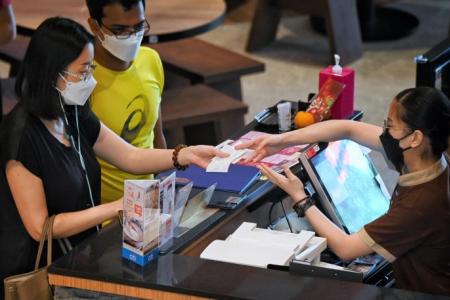Budget 2022: Singapore to raise GST from 7% to 9% in two stages in 2023 and 2024
The goods and service tax (GST) rate will increase from 7 to 9 per cent in two stages - one percentage point each time on Jan 1, 2023 and Jan 1, 2024.
The $6 billion Assurance Package earlier announced in 2020 to cushion the impact of the GST hike will also receive a boost of $640 million, totalling $6.6 billion, said Finance Minister Lawrence Wong on Friday (Feb 18) in his maiden Budget speech.
The delayed GST hike, which will bring in about 0.7 per cent of gross domestic product in revenue annually - about $3.5 billion - when the full hike is in place in 2024, will go towards supporting healthcare expenditure and to take care of senior citizens while other areas of social spending rise as well.
GST revenue by itself will not be sufficient to cover additional healthcare spending, said Mr Wong. That is why Singapore needs not only the GST increase but also the changes to personal income tax, property tax and vehicle tax which he had announced earlier in his speech, he added.
Where the timing of GST is concerned, Mr Wong said he had carefully considered the overall situation - the ongoing pandemic, the state of the economy and the outlook for inflation.
"Our revenue needs are pressing. But I also understand the concerns that Singaporeans have about the GST increase taking place at the same time as rising prices," he said.
That is why the GST increase will be delayed to 2023 and the hike will be staggered over two steps - first, from 7 per cent to 8 per cent on Jan 1, 2023; followed by 8 per cent to 9 per cent on Jan 1, 2024.
GST will continue to be absorbed on publicly-subsidised healthcare and education, said Mr Wong.
"I want to assure all Singaporeans that we will continue to implement the GST in our unique Singaporean way, with features and schemes that support the less well-off," he added.
Singapore first announced a planned 2 percentage point GST increase from 7 per cent to 9 per cent in 2018, but it was delayed due to the Covid-19 pandemic.
On Friday, Mr Wong said he will also provide town councils with an additional $15 million annually to absorb the additional GST payable on service and conservancy charges.
Government fees and charges will also not be increased for a year from Jan 1, 2023, he said.
This will apply to licence fees - such as driving licences - as well as fees charged by Government agencies for the provision of services. This includes school fees such as Institute of Technical Education and polytechnic fees, and charges in public carparks, he said.
It does not apply to fees determined by non-Government entities such as universities or electronic road pricing charges.
To address concerns that businesses could use GST as a cover to raise prices, a Committee Against Profiteering, chaired by Minister of State for Trade and Industry Low Yen Ling, will be formed.
The enhanced Assurance Package - with seven components - will distribute payouts to Singaporeans over the next five years.
For a majority of Singaporean households, the offsets from the package will cover at least five years of additional GST expenses, said Mr Wong.
For lower-income households who receive much more, the offsets will cover about ten years’ worth, he added.
The package will include cash payouts, additional U-Save rebates for utilities and MediSave top-ups, among others.
Get The New Paper on your phone with the free TNP app. Download from the Apple App Store or Google Play Store now


